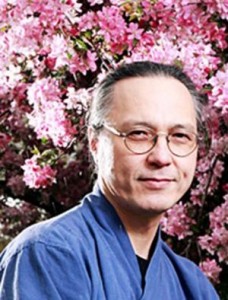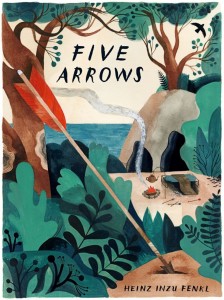English Professor’s Autobiographical Fiction Published in The New Yorker
It took Heinz Insu Fenkl 38 years to see an original story published in The New Yorker, but his “pig-headed perseverance, born out of experience” made possible the career-crowning success of “Five Arrows,” featured in the magazine’s August 3, 2015 issue.

Fenkl is an associate professor of English and affiliate of the Asian Studies Program. He shared his decades-long admiration for The New Yorker and the laborious editing process behind its reputation as the world’s foremost literary magazine during a September 17 reading and discussion in the Lecture Center.
An autobiographical fiction, “Five Arrows” follows young Insu, who journeys across the river in the South Korean countryside with his cousin, Youngsu. The boys set out to visit their “Big Uncle,” whose family has banished him to live in a cave because of his festering, pungent foot wound.
Big Uncle dispatches the boys into the woods to retrieve five arrows, and when Insu returns alone, his uncle tells him the story of his wounding. One night after a festival, he’d chased a ghost light into the woods for hours, finally collapsing beneath a tree and losing consciousness. When he woke, he discovered two scars on his foot. He recalled the origins of the wound years later, when in a dream, he found himself seduced by a raven-haired beauty dressed in silk, “the ghost of a virgin who had died a very long time ago.” The wound, Big Uncle tells Insu, “was the price I had to pay for my enjoyment, and I will have to keep paying it until I go into the next world.”
The story of “Five Arrows” is taken from Fenkl’s in-progress autobiographical novel, Skull Water, scheduled to be published by Graywolf Press in 2017. The New Yorker editors rejected his first version of “Five Arrows,” saying there was too much “pointing outside the story,” but encouraged Fenkl to shorten it and make it more self-contained.
Fenkl shaved over 1,000 words, resubmitted the story and received the news of its acceptance from his  agent on July 10, his wife’s birthday. Though Fenkl originally submitted the piece as nonfiction, the editors said publishing it as fiction would give them more leeway to edit it and make it a better story. An intense, two-week revision process followed, with The New Yorker’s team of fiction editors each sending Fenkl a round of edits via email.
agent on July 10, his wife’s birthday. Though Fenkl originally submitted the piece as nonfiction, the editors said publishing it as fiction would give them more leeway to edit it and make it a better story. An intense, two-week revision process followed, with The New Yorker’s team of fiction editors each sending Fenkl a round of edits via email.
Fenkl said the magazine has a “very high standard, probably the highest standard for editing fiction, in the world,” a reputation he discovered to be “well deserved and earned.” Describing the insistence of one copy editor’s notes on punctuation and sentence logic, Fenkl joked, “I could imagine him sitting in a windowless office like in A Christmas Carol with these fingerless gloves, and his pen was like a sword. I wouldn’t be surprised if he’d challenge you to a duel over a sentence.”
Writers can choose to reject or accept individual edits, and the magazine prefers to work with writers who are willing to collaborate. Fenkl said he was well-served by his previous collaboration with the magazine, a 2011 translation of “An Anonymous Island” by Korean writer Yi Mun-yol, in 2011.
Fenkl’s agent made him buy a smart phone to check email, and he sometimes had less than 24 hours to respond to edits. His final editing session occurred over the phone, in between classes.
The collaborative editing process served as a stark counterpoint to Fenkl’s solitary writing style. Responding to a student question, Fenkl said he preferred to write by hand in an unlined, bound notebook with a pencil or fountain pen, “because they’re smooth and have a sense of texture to them and make the writing feel more organically alive.”
Fenkl submitted his first story to The New Yorker in 1977, when he was only 17, and advised writers that though the odds of being published may seem great, they must persevere. He encouraged attendees to edit “multiple times” before sending stories out for consideration, but cautioned against allowing one’s analytical mind to overtake the creative process. Fenkl confessed to using a few tricks—writing with his non-dominant left hand so that his concentration is focused solely on writing or typing stories on a computer with the screen turned off.
Referencing the European tradition of memory theater, Fenkl said if you locate a vivid memory, “you can just walk through the memory,” describe it as you go, and worry about editing once you’ve captured it on paper or screen.
Just as Big Uncle followed the ghost light to his destiny, Fenkl advised writers to proceed boldly. “You have to write like you’re chasing something,” he said.
__
Read “Five Arrows” and an interview with Fenkl on The New Yorker website. An audio version of the story, read by Fenkl, can be accessed opn SoundCloud.
